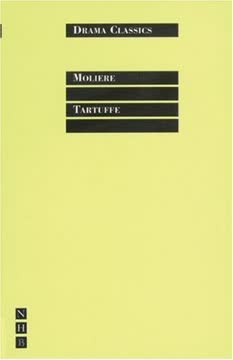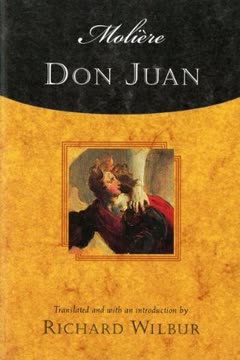Plot Summary
Schemes of Control
Arnolphe, a middle-aged man obsessed with avoiding the humiliation of being cuckolded, devises a meticulous scheme: he will marry a woman so ignorant and sheltered that she cannot possibly deceive him. He adopts Agnès, a poor girl, and raises her in seclusion, ensuring she remains innocent and unworldly. His friend Chrysalde warns him that such extreme measures may backfire, but Arnolphe is convinced that ignorance is the surest path to fidelity. He even changes his name to Monsieur de la Souche, symbolizing his desire to root his future in control and secrecy. The stage is set for a battle between manipulation and the unpredictable forces of love and human nature.
Innocence in Isolation
Agnès, raised in a convent and then kept in a remote house, knows little of the world beyond her needlework and prayers. Her innocence is so profound that she asks childlike questions, amusing Arnolphe and confirming his belief in her simplicity. The servants, Alain and Georgette, are equally unsophisticated, creating a household cut off from society. Agnès's days are filled with mundane tasks, and she is taught to obey without question. Yet, beneath her docility, there is a gentle curiosity and a longing for connection, which will soon be awakened by forces beyond Arnolphe's control.
The Jealous Guardian
Arnolphe's obsession with control manifests in rigid rules for Agnès and his servants. He forbids visitors, monitors Agnès's every move, and lectures her on the dangers of men. His jealousy is palpable, and he views every interaction as a potential threat to his honor. The servants, bewildered by his intensity, struggle to understand his motives. Arnolphe's fear of ridicule and betrayal drives him to ever-greater extremes, blinding him to the possibility that his own actions may sow the seeds of rebellion and desire in Agnès's heart.
A Chance Encounter
The arrival of Horace, the charming son of Arnolphe's old friend Oronte, introduces a spark of unpredictability. Horace, unaware of Arnolphe's double identity, confides in him about his infatuation with a mysterious girl—Agnès. Through a series of innocent gestures and the help of a meddling old woman, Horace and Agnès meet and are instantly drawn to each other. Horace's openness and youthful passion contrast sharply with Arnolphe's secrecy and suspicion, setting the stage for a rivalry that will test the limits of control and innocence.
Ignorance Meets Love
Agnès, bewildered yet enchanted by Horace's attentions, experiences feelings she cannot name. She recounts to Arnolphe, with childlike candor, how she met Horace and how his words and gifts made her feel. Her innocence is both her shield and her vulnerability; she cannot comprehend why her actions might be wrong. Arnolphe, torn between relief at her naivety and fear of her growing attachment, tries to reassert his authority, but Agnès's heart has been touched by something beyond his control.
The Rival Revealed
Arnolphe's worst fears are realized when Horace, still unaware of Arnolphe's true identity, confides in him about his love for Agnès and his plans to win her. Arnolphe is forced to mask his rage and jealousy, listening as Horace describes his successes and setbacks. The irony is bitter: the man who sought to outwit fate finds himself the confidant of his own rival. Arnolphe's attempts to tighten his grip only deepen Agnès's longing and Horace's determination.
Lessons in Obedience
Determined to reclaim control, Arnolphe delivers a series of stern lectures to Agnès about the duties of a wife and the dangers of disobedience. He presents her with a list of maxims, demanding absolute submission and warning of dire consequences for any deviation. Agnès listens dutifully but is increasingly unsettled by the contrast between Arnolphe's oppressive rules and the joy she feels with Horace. The seeds of resistance are sown, and Agnès begins to question the life Arnolphe has planned for her.
The Letter's Betrayal
Despite Arnolphe's efforts, Agnès's feelings for Horace deepen. She writes him a heartfelt letter, expressing her confusion and longing. The letter, delivered with innocent cunning, becomes a turning point: it reveals to Horace the depth of her affection and to Arnolphe the futility of his schemes. Love, it seems, has taught Agnès more in days than Arnolphe's lessons did in years. The letter is both a confession and a rebellion, signaling Agnès's awakening to her own desires.
Love's Awakening
Emboldened by her love for Horace, Agnès begins to assert herself. She resists Arnolphe's commands, questions his authority, and openly expresses her preference for Horace. Her transformation from passive pupil to active agent is both touching and inevitable. Arnolphe, confronted with the limits of his power, oscillates between anger, pleading, and despair. The emotional stakes rise as Agnès's innocence gives way to self-awareness, and the balance of power shifts.
The Watchful Prison
In a last-ditch effort to prevent Agnès from escaping, Arnolphe tightens his surveillance, enlisting his servants and even a cobbler as spies. He forbids all contact with the outside world and prepares to marry her by force. Yet, the more he tries to imprison her, the more Agnès's spirit yearns for freedom. The household becomes a battleground of wills, with love and fear locked in a struggle that neither can win alone.
Plots and Counterplots
Horace, aided by Agnès's growing courage, devises plans to outwit Arnolphe. Secret meetings, coded signals, and daring escapes are attempted, each fraught with risk and near-discovery. Arnolphe, ever vigilant, counters with his own plots, determined to thwart the lovers at every turn. The tension mounts as both sides maneuver for advantage, and the outcome hangs in the balance. The comedy of errors is tinged with genuine emotion, as hope and desperation collide.
The Night of Deceit
Under cover of darkness, Horace attempts to rescue Agnès, only to be ambushed by Arnolphe's servants. In the chaos, Horace feigns death to escape further harm, and Agnès, believing him lost, is overcome with grief. The night is a crucible for all involved: Arnolphe is tormented by guilt and fear, Agnès is driven to despair, and Horace, though battered, remains resolute. The farcical violence underscores the tragic consequences of obsession and misunderstanding.
The Failed Escape
Agnès, attempting to flee with Horace, is recaptured by Arnolphe, who confronts her with accusations and threats. Agnès, no longer cowed, defends her actions and declares her love for Horace. Arnolphe's authority crumbles in the face of her honesty and determination. The confrontation is raw and revealing, exposing the emotional costs of control and the irrepressible force of love. Agnès's refusal to submit marks the true end of Arnolphe's power over her.
Truths Unmasked
As dawn breaks, the tangled web of secrets begins to unravel. Horace's father, Oronte, arrives with Enrique, Agnès's long-lost father, seeking to arrange a marriage for Horace. Arnolphe, desperate to salvage his plans, tries to manipulate the situation, but the truth cannot be contained. The recognition of Agnès's true identity transforms her from a ward to an heiress, and the balance of power shifts decisively. The stage is set for reconciliation and justice.
The Power of Choice
With her parentage revealed and her future no longer in Arnolphe's hands, Agnès is finally free to choose her own path. She rejects Arnolphe's pleas and threats, affirming her love for Horace and her right to happiness. The other characters, witnessing her transformation, are forced to confront their own assumptions and desires. The resolution is both comic and cathartic, as the characters are liberated from the roles imposed upon them.
The Father's Return
Enrique's return brings closure to the mystery of Agnès's origins. He recognizes her as his daughter and claims her as his own, restoring her to her rightful place in society. The reunion is joyful and bittersweet, as Agnès is freed from her captivity but must also reckon with the scars of her upbringing. Enrique's authority supersedes Arnolphe's, and the promise of a new beginning emerges from the chaos.
Identities Discovered
The final revelations expose the full extent of Arnolphe's deception and the interconnectedness of the characters' fates. Agnès's true identity as Enrique's daughter is confirmed, and the planned marriage between Horace and Agnès is sanctioned by both families. Arnolphe, humiliated and defeated, is left to contemplate the folly of his schemes. The restoration of order is both just and merciful, as forgiveness and understanding replace suspicion and control.
Freedom and Forgiveness
The play concludes with the promise of a happier future for Agnès and Horace, united by love and free from manipulation. Arnolphe, chastened by his failure, is left to reflect on the limits of control and the unpredictability of the human heart. The other characters, reconciled and enlightened, celebrate the triumph of love over fear. The emotional journey, from innocence to self-awareness, is complete, and the lessons of the story resonate with hope and possibility.
Characters
Arnolphe (Monsieur de la Souche)
Arnolphe is the architect of his own downfall, driven by a pathological fear of betrayal. His decision to raise Agnès in ignorance is both a manifestation of his misogyny and a desperate attempt to outwit fate. He is intelligent but blinded by his own prejudices, unable to see that love cannot be manufactured or contained. His relationship with Agnès is paternalistic and possessive, and his interactions with others are marked by suspicion and manipulation. Over the course of the play, Arnolphe's psychological rigidity is exposed as both tragic and ridiculous. His eventual defeat is not just a personal loss but a broader commentary on the futility of trying to control the hearts and minds of others.
Agnès
Agnès begins as a blank slate, molded by Arnolphe's strictures and isolated from the world. Her innocence is genuine, but it is also a source of strength; she is open to new experiences and untainted by cynicism. As she encounters Horace and discovers love, Agnès undergoes a profound transformation. She learns to question authority, assert her desires, and claim her independence. Her journey from passive obedience to active choice is the emotional core of the story. Agnès's psychological development is marked by a growing self-awareness and a refusal to be defined by others' expectations. Her ultimate triumph is a testament to the resilience of the human spirit.
Horace
Horace is the embodiment of youthful passion and optimism. He falls in love with Agnès at first sight and pursues her with determination and creativity. Unlike Arnolphe, Horace is open, trusting, and willing to take risks for love. His relationship with Agnès is based on mutual affection and respect, and he encourages her to think and feel for herself. Horace's psychological makeup is characterized by a blend of idealism and resourcefulness. He is not without flaws—his naivety sometimes leads him into danger—but his sincerity and courage ultimately win the day. Horace's growth mirrors Agnès's, as both learn to navigate the complexities of love and autonomy.
Chrysalde
Chrysalde serves as Arnolphe's confidant and foil, offering a more balanced perspective on marriage and fidelity. He cautions Arnolphe against extreme measures and advocates for a middle path between blind trust and obsessive control. Chrysalde's psychological insight and empathy make him a stabilizing force in the narrative. He is neither a cynic nor a fool, but a realist who understands the limitations of human nature. His role is to challenge Arnolphe's assumptions and to remind the audience of the value of compassion and common sense.
Oronte
Oronte, Horace's father, represents the older generation's values and expectations. He is well-meaning but somewhat rigid, seeking to arrange his son's marriage for social and familial advantage. Oronte's relationship with Horace is affectionate but hierarchical, and he is initially unaware of the true nature of his son's feelings. His eventual acceptance of Horace and Agnès's love signals a willingness to adapt and to prioritize happiness over convention.
Enrique
Enrique, Agnès's biological father, is a figure of reconciliation and restoration. His return resolves the central mystery of Agnès's identity and provides her with a legitimate place in society. Enrique's actions are motivated by love and a desire to make amends for past mistakes. He embodies the possibility of forgiveness and new beginnings, and his presence brings closure to the story's conflicts.
Alain
Alain, Arnolphe's servant, is a source of comic relief and a symbol of the play's rural innocence. He is loyal to Arnolphe but easily confused, often caught between conflicting loyalties and instructions. Alain's psychological simplicity contrasts with the complexity of the main characters, highlighting the absurdity of Arnolphe's schemes. His interactions with Georgette provide moments of levity and underscore the play's themes of misunderstanding and miscommunication.
Georgette
Georgette, the female servant, is pragmatic and down-to-earth. She is more perceptive than Alain and often serves as a sounding board for Agnès's concerns. Georgette's loyalty is tempered by a healthy skepticism, and she is not above questioning Arnolphe's orders. Her role is to ground the action in everyday reality and to provide a counterpoint to the more fantastical elements of the plot.
The Notary
The Notary is a minor but pivotal character, called upon to formalize Arnolphe's plans for marriage. His presence underscores the legal and social constraints that shape the characters' lives. The Notary's obliviousness to the emotional turmoil around him adds to the play's satirical edge, highlighting the gap between law and lived experience.
The Old Woman (offstage influence)
Though she appears only briefly, the old woman who facilitates Horace and Agnès's first meeting is a crucial catalyst. She represents the unpredictable forces of fate and the subversive power of female solidarity. Her actions set the plot in motion and challenge Arnolphe's illusion of control.
Plot Devices
Dramatic Irony and Disguised Identity
Molière masterfully employs dramatic irony, particularly through Arnolphe's double identity as Monsieur de la Souche. The audience is privy to information that the characters lack, heightening the tension and comedy. Horace's confiding in Arnolphe about his love for Agnès, unaware that Arnolphe is her guardian and rival, creates a web of misunderstandings that drive the plot. This device exposes the limitations of control and the inevitability of fate.
Letters and Secret Communication
Letters play a pivotal role in advancing the plot and revealing character. Agnès's letter to Horace is both a confession of love and an act of rebellion against Arnolphe's authority. The written word becomes a means of self-expression and agency, challenging the spoken commands of the patriarch. The exchange of letters also serves as a metaphor for the emergence of individual voice and desire.
Foreshadowing and Reversal
The play is rich in foreshadowing, with early warnings about the dangers of excessive control and the unpredictability of love. Chrysalde's cautions to Arnolphe, the old woman's intervention, and Agnès's innocent questions all hint at the eventual unraveling of Arnolphe's plans. The narrative structure is built around reversals of fortune, as schemes are upended and identities revealed. These reversals underscore the theme that human beings cannot escape the consequences of their actions.
Satire and Social Commentary
Molière uses satire to critique the social norms of his time, particularly the treatment of women and the obsession with honor. The exaggerated rules Arnolphe imposes on Agnès, the farcical violence, and the legalistic interventions of the Notary all serve to lampoon the institutions that perpetuate inequality and repression. The play's humor is both biting and humane, inviting the audience to laugh at folly while recognizing its real-world consequences.
Analysis
"The School for Wives" remains a sharp and relevant exploration of the dangers of trying to engineer human relationships. Molière exposes the folly of believing that ignorance can guarantee virtue, or that love can be commanded by rules and isolation. Through the psychological evolution of Agnès and the unraveling of Arnolphe's schemes, the play champions the power of self-discovery and the right to choose one's own destiny. The use of dramatic irony, satire, and reversal not only entertains but also challenges audiences to question the assumptions underlying gender roles, authority, and social order. Ultimately, the story is a celebration of resilience and the triumph of the human spirit over fear and manipulation. Its lessons—about trust, autonomy, and the necessity of letting go—resonate as strongly today as they did in Molière's time.
Last updated:
Review Summary
The School for Wives is a comedic play by Molière that satirizes marriage, gender roles, and societal expectations. Many readers find it humorous and well-written, praising Molière's wit and clever dialogue. The story follows Arnolphe, an older man who raises a young girl to be his ignorant, submissive wife, only to have his plans foiled when she falls for a younger man. While some find the themes dated, others appreciate the play's historical and literary value. Reviews are mixed, with some loving the comedy and others finding it difficult to connect with.
Download PDF
Download EPUB
.epub digital book format is ideal for reading ebooks on phones, tablets, and e-readers.







